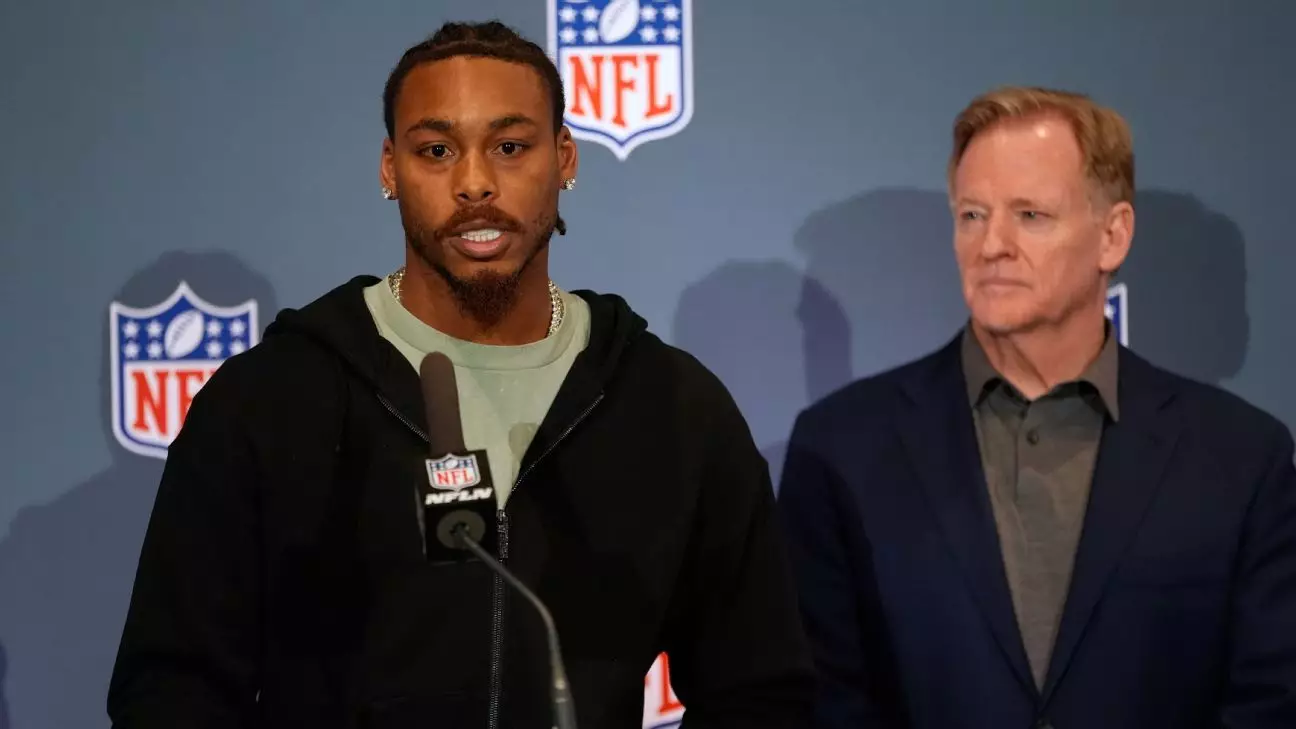In an electrifying moment for the NFL, Justin Jefferson, the Minnesota Vikings’ star wide receiver, recently celebrated a groundbreaking decision that heralds a new era for the sport. The NFL’s unanimous vote to include flag football in the 2028 Los Angeles Olympics marks a monumental shift in how American football interacts with the global sports community. Jefferson, grinning widely, performed an “Olympic Griddy” dance at a news conference, encapsulating the excitement surrounding this historical decision. His reaction reflects not just personal joy but a deeper, shared dream of integrating football into the global sports lexicon for future generations.
Jefferson articulated what many fans and players alike feel: the Olympics presents an extraordinary opportunity to showcase athletic talent on a worldwide stage. As he reminisced about watching the iconic “Dream Team” in basketball during his childhood, it becomes evident that this venture transcends mere competition. It signifies the chance to connect, to foster unity through the love of sport, and to earn the prestigious gold medal that every athlete covets. The global reach of this initiative is crucial as football seeks to establish itself as a universally recognized sport.
The Enthusiasm from NFL Executives
This initiative has spurred excitement not only among players but also within the higher echelons of the NFL. Troy Vincent, an executive vice president of football operations, echoed Jefferson’s enthusiasm, predicting that this expansion will allow the world to experience the incredible talent that comprises the league. The prospect of showcasing athletes from various backgrounds, representing their respective nations in flag football, adds a layer of richness to the Olympics. This inclusivity could, in many ways, redefine what it means to be part of the NFL, as players would potentially embrace dual identities—one as a professional athlete and one as a representative of their country.
One cannot dismiss the logistical complexities that accompany this new venture. NFL players have demanding schedules, and balancing participation in both the NFL and the Olympics poses unique challenges. The successful integration of these two timelines will require meticulous planning. Peter O’Reilly, another NFL executive, emphasized the importance of coordinating the NFL calendar with Olympic events, highlighting how crucial it is to ensure that players are neither overworked nor sidelined due to schedule conflicts. It’s a balancing act that must consider player welfare while maximizing this landmark opportunity.
Skills and Preparation: The Road Ahead
While NFL players are undoubtedly equipped with impressive athletic capabilities, flag football introduces a different set of skills. Unlike traditional tackle football, this variant emphasizes agility, speed, and strategic movement without physical contact. As Brian Asamoah II, another Global Flag Ambassador, pointed out, flag football requires a different skill set, and respect must be accorded to athletes who have trained specifically for this discipline. The NFL’s players are not just stepping onto the field as established athletes; they’re engaging in a game that demands a fresh perspective on tactics and physicality.
This new landscape does not come without its challenges. As Jefferson pondered, the physical demands of transitioning from the NFL to flag football may challenge players who are accustomed to the rigors of full-contact play. The training regimens, mental preparation, and even recovery protocols may have to shift to accommodate this new athletic endeavor. However, the prospect of competing for one’s country and experiencing Olympic glory is a compelling incentive that could motivate athletes to embrace the necessary adaptations.
A Shift in Competitive Spirit
The NFL’s commitment to allowing its players to explore opportunities in flag football may serve to reinvigorate the sport. It presents budding young athletes with a pathway to the Olympics, expanding their aspirations beyond traditional football. The proposal also signals a commitment to diversity within the sports community, allowing athletes to capitalize on their unique backgrounds and heritage, potentially competing for different countries. This influx of varied narratives and experiences may lead to richer competition and a more compelling story in sports.
Although the road ahead may be filled with challenges, the prospect of Olympic competition ignites a transformative energy within the sport. As Jefferson and his fellow athletes begin to consider the implications and potential of this opportunity, the excitement surrounding flag football grows. What once was a secondary sport is fast becoming a thriving aspect of the global sports framework. Thus, as players prepare for this new chapter, the spotlight shines brightly, making the upcoming Olympic games not just a chance for individual accolades but a vibrant festival of global athleticism that celebrates the beauty of sportsmanship.


Leave a Reply